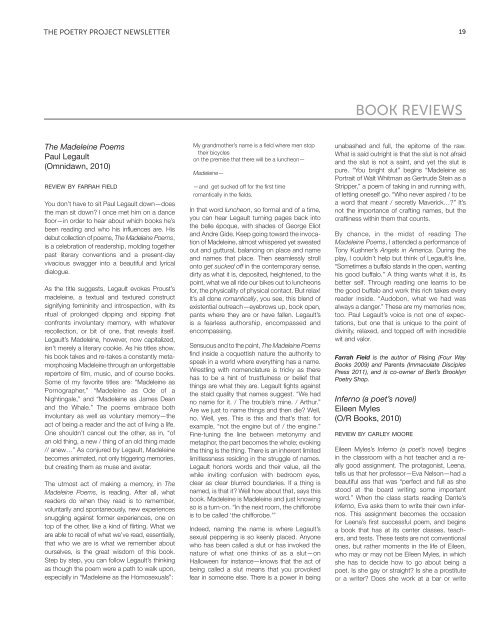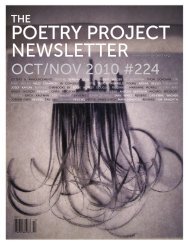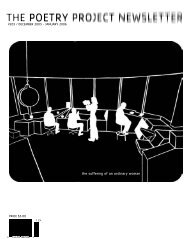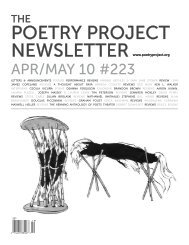Create successful ePaper yourself
Turn your PDF publications into a flip-book with our unique Google optimized e-Paper software.
THE POETRY PROJECT NEWSLETTER19BOOK REVIEWS<strong>The</strong> Madeleine PoemsPaul Legault(Omnidawn, 2010)review by farrah fieldYou don’t have to sit Paul Legault down—doesthe man sit down? I once met him on a dancefloor—in order to hear about which books he’sbeen reading and who his influences are. Hisdebut collection of poems, <strong>The</strong> Madeleine Poems,is a celebration of readership, molding togetherpast literary conventions and a present-dayvivacious swagger into a beautiful and lyricaldialogue.As the title suggests, Legault evokes Proust’smadeleine, a textual and textured constructsignifying femininity and introspection, with itsritual of prolonged dipping and sipping thatconfronts involuntary memory, with whateverrecollection, or bit of one, that reveals itself.Legault’s Madeleine, however, now capitalized,isn’t merely a literary cookie. As his titles show,his book takes and re-takes a constantly metamorphosingMadeleine through an unforgettablerepertoire of film, music, and of course books.Some of my favorite titles are: “Madeleine asPornographer,” “Madeleine as Ode of aNightingale,” and “Madeleine as James Deanand the Whale.” <strong>The</strong> poems embrace bothinvoluntary as well as voluntary memory—theact of being a reader and the act of living a life.One shouldn’t cancel out the other, as in, “ofan old thing, a new / thing of an old thing made// anew…” As conjured by Legault, Madeleinebecomes animated, not only triggering memories,but creating them as muse and avatar.<strong>The</strong> utmost act of making a memory, in <strong>The</strong>Madeleine Poems, is reading. After all, whatreaders do when they read is to remember,voluntarily and spontaneously, new experiencessnuggling against former experiences, one ontop of the other, like a kind of flirting. What weare able to recall of what we’ve read, essentially,that who we are is what we remember aboutourselves, is the great wisdom of this book.Step by step, you can follow Legault’s thinkingas though the poem were a path to walk upon,especially in “Madeleine as the Homosexuals”:My grandmother’s name is a field where men stoptheir bicycleson the premise that there will be a luncheon—Madeleine——and get sucked off for the first timeromantically in the fields.In that word luncheon, so formal and of a time,you can hear Legault turning pages back intothe belle époque, with shades of George Eliotand Andre Gide. Keep going toward the invocationof Madeleine, almost whispered yet sweatedout and guttural, balancing on place and nameand names that place. <strong>The</strong>n seamlessly strollonto get sucked off in the contemporary sense,dirty as what it is, deposited, heightened, to thepoint, what we all ride our bikes out to luncheonsfor, the physicality of physical contact. But relax!It’s all done romantically, you see, this blend ofexistential outreach—eyebrows up, book open,pants where they are or have fallen. Legault’sis a fearless authorship, encompassed andencompassing.Sensuous and to the point, <strong>The</strong> Madeleine Poemsfind inside a coquettish nature the authority tospeak in a world where everything has a name.Wrestling with nomenclature is tricky as therehas to be a hint of trustfulness or belief thatthings are what they are. Legault fights againstthe staid quality that names suggest. “We hadno name for it. / <strong>The</strong> trouble’s mine. / Arthur.”Are we just to name things and then die? Well,no. Well, yes. This is this and that’s that: forexample, “not the engine but of / the engine.”Fine-tuning the line between metonymy andmetaphor, the part becomes the whole; evokingthe thing is the thing. <strong>The</strong>re is an inherent limitedlimitlessness residing in the struggle of names.Legault honors words and their value, all thewhile inviting confusion with bedroom eyes,clear as clear blurred boundaries. If a thing isnamed, is that it? Well how about that, says thisbook. Madeleine is Madeleine and just knowingso is a turn-on. “In the next room, the chifforobeis to be called ‘the chifforobe.’”Indeed, naming the name is where Legault’ssexual peppering is so keenly placed. Anyonewho has been called a slut or has invoked thenature of what one thinks of as a slut—onHalloween for instance—knows that the act ofbeing called a slut means that you provokedfear in someone else. <strong>The</strong>re is a power in beingunabashed and full, the epitome of the raw.What is said outright is that the slut is not afraidand the slut is not a saint, and yet the slut ispure. “You bright slut” begins “Madeleine asPortrait of Walt Whitman as Gertrude Stein as aStripper,” a poem of taking in and running with,of letting oneself go. “Who never aspired / to bea word that meant / secretly Maverick…?” It’snot the importance of crafting names, but thecraftiness within them that counts.By chance, in the midst of reading <strong>The</strong>Madeleine Poems, I attended a performance ofTony Kushner’s Angels in America. During theplay, I couldn’t help but think of Legault’s line,“Sometimes a buffalo stands in the open, wantinghis good buffalo.” A thing wants what it is, itsbetter self. Through reading one learns to bethe good buffalo and work this rich takes everyreader inside. “Audobon, what we had wasalways a danger.” <strong>The</strong>se are my memories now,too. Paul Legault’s voice is not one of expectations,but one that is unique to the point ofdivinity, relaxed, and topped off with incrediblewit and valor.Farrah Field is the author of Rising (Four WayBooks 2009) and Parents (Immaculate DisciplesPress 2011), and is co-owner of Berl’s Brooklyn<strong>Poetry</strong> Shop.Inferno (a poet’s novel)Eileen Myles(O/R Books, 2010)review by carley mooreEileen Myles’s Inferno (a poet’s novel) beginsin the classroom with a hot teacher and a reallygood assignment. <strong>The</strong> protagonist, Leena,tells us that her professor—Eva Nelson—had abeautiful ass that was “perfect and full as shestood at the board writing some importantword.” When the class starts reading Dante’sInferno, Eva asks them to write their own infernos.This assignment becomes the occasionfor Leena’s first successful poem, and beginsa book that has at its center classes, teachers,and tests. <strong>The</strong>se tests are not conventionalones, but rather moments in the life of Eileen,who may or may not be Eileen Myles, in whichshe has to decide how to go about being apoet. Is she gay or straight? Is she a prostituteor a writer? Does she work at a bar or write
















